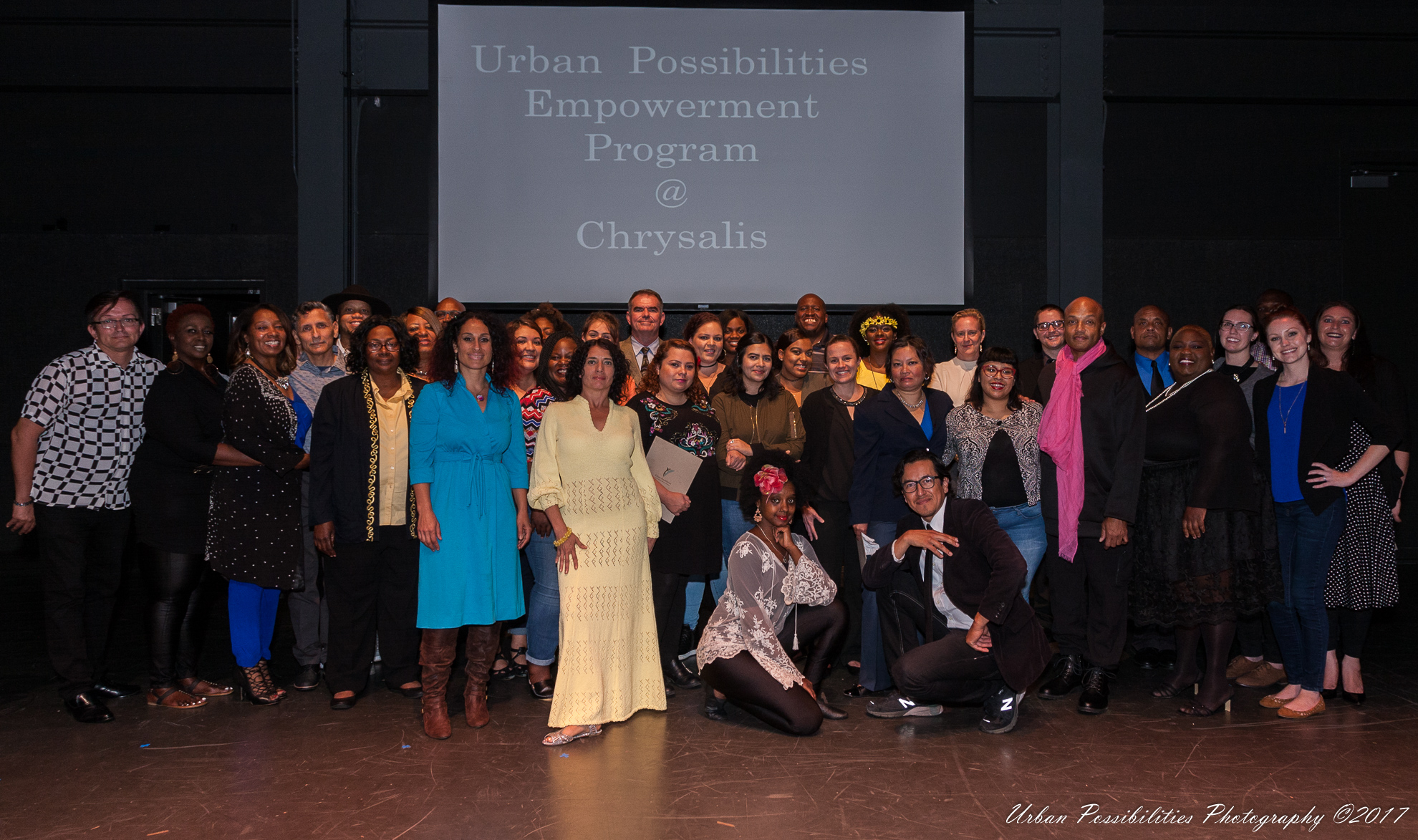Eyvette Jones Johnson and her husband Craig Johnson are founders of Urban Possibilities, an empowerment program that uses writing and performance to help inner-city job seekers thrive in the marketplace and in life. Craig is a photographer who chronicles their journey and Eyvette serves as executive director. For fifteen years, she was a TV producer creating shows for networks that include CBS, NBC, ABC, and PBS. Today, she uses skills honed in entertainment to help adults find their voices, tell their stories, and bring diverse audiences together to celebrate their talent. 80 percent of Urban Possibilities students are or have been homeless.
 Each time an inner-city job seeker walks through our doors, we see unparalleled treasure. To make sure audiences and employers see it too, we know our job is to deliver light into deep dark places. The voices and stories of our students are buried under life’s toughest circumstances: homelessness, joblessness, abuse, addiction, and military trauma, among others. Our students are adults, often marginalized, fighting to survive and searching for work in the homeless capital of America: Los Angeles.
Each time an inner-city job seeker walks through our doors, we see unparalleled treasure. To make sure audiences and employers see it too, we know our job is to deliver light into deep dark places. The voices and stories of our students are buried under life’s toughest circumstances: homelessness, joblessness, abuse, addiction, and military trauma, among others. Our students are adults, often marginalized, fighting to survive and searching for work in the homeless capital of America: Los Angeles.
Supported by Poets & Writers from the day we began, our twelve-week Writing Empowerment program at Chrysalis job center is a fueling station that turns pain into power for those making their way back from the abyss. Writing and sharing their truths help ignite their comeback. Weekly classes, most recently led by P&W–supported teaching artist Jesse Bliss, help urban job seekers deal with trauma, rediscover their strength, and tell their stories poetically and with power—all skills needed for a successful job search.
Each class culminates in a public performance by students of their original work. Teaching artists from our partners at the Geffen Playhouse coach students to perform their pieces. In each show, we watch our students take the stage and take flight, including students like Norma and Keith.
 In our classes, it is common to have students who have been rendered mute by the brutal blows they’ve faced, and Norma was no exception. A middle class woman hurled into silence and homelessness by domestic violence, she’d lost her will months before we met. Norma said, “I was preparing to take my life but this class opened my heart to see beyond my darkness and despair and showed me the greatness that was always there. Now I use my voice in the service of others like me. I use my talent to create change.”
In our classes, it is common to have students who have been rendered mute by the brutal blows they’ve faced, and Norma was no exception. A middle class woman hurled into silence and homelessness by domestic violence, she’d lost her will months before we met. Norma said, “I was preparing to take my life but this class opened my heart to see beyond my darkness and despair and showed me the greatness that was always there. Now I use my voice in the service of others like me. I use my talent to create change.”
Keith was silent in another way. A soldier in the British Army for over twenty years, he lived from a young age with the ravages of war and in the daily human wreckage of combat zones. He survived in a band of brothers, but watched many of them fall. His closest friend died in his arms in the heat of battle. As a soldier and a Brit, he was taught to keep it all in, buttoned up tight. “Expressing your feelings was something you just didn’t do. But I learned by sharing my story the burdens I carried magically started to lessen and this incredible feeling of empowerment took over. Now in expressing I have the ability to receive and give back,” said Keith.
Norma and Keith were featured artists at Poets & Writers’ Connecting Cultures Reading this summer. As my husband Craig and I watched them poised on the stage, they affirmed beliefs that have become our true north: that there is a sea of untapped potential in inner-city communities just waiting to be set free; our history, no matter how devastating, does not have to dictate our destiny; and the greatest treasures are often buried where many least expect to find them, like the exquisite gold in plain sight walking the streets of Los Angeles’s Skid Row.

Support for Readings & Workshops in California is provided by the California Arts Council, a state agency, and the National Endowment for the Arts, a federal agency. Additional support comes from the Friends of Poets & Writers.
Photos: (top) Eyvette Jones Johnson (Credit: Craig Johnson Photography). (middle) Eyvette Jones Johnson with Norma L. Eaton and Keith Brown (Credit: Craig Johnson Photography). (bottom) Urban Possibilities workshop reading group shot with Chrysalis staff (Credit: Craig Johnson Photography).




 Each time an inner-city job seeker walks through our doors, we see unparalleled treasure. To make sure audiences and employers see it too, we know our job is to deliver light into deep dark places. The voices and stories of our students are buried under life’s toughest circumstances: homelessness, joblessness, abuse, addiction, and military trauma, among others. Our students are adults, often marginalized, fighting to survive and searching for work in the homeless capital of America: Los Angeles.
Each time an inner-city job seeker walks through our doors, we see unparalleled treasure. To make sure audiences and employers see it too, we know our job is to deliver light into deep dark places. The voices and stories of our students are buried under life’s toughest circumstances: homelessness, joblessness, abuse, addiction, and military trauma, among others. Our students are adults, often marginalized, fighting to survive and searching for work in the homeless capital of America: Los Angeles. In our classes, it is common to have students who have been rendered mute by the brutal blows they’ve faced, and Norma was no exception. A middle class woman hurled into silence and homelessness by domestic violence, she’d lost her will months before we met. Norma said, “I was preparing to take my life but this class opened my heart to see beyond my darkness and despair and showed me the greatness that was always there. Now I use my voice in the service of others like me. I use my talent to create change.”
In our classes, it is common to have students who have been rendered mute by the brutal blows they’ve faced, and Norma was no exception. A middle class woman hurled into silence and homelessness by domestic violence, she’d lost her will months before we met. Norma said, “I was preparing to take my life but this class opened my heart to see beyond my darkness and despair and showed me the greatness that was always there. Now I use my voice in the service of others like me. I use my talent to create change.”